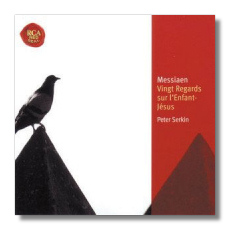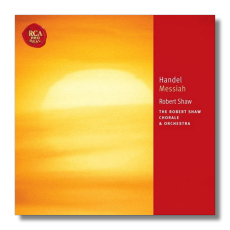
The Internet's Premier Classical Music Source
Related Links
- Latest Reviews
- More Reviews
-
By Composer
-
Collections
DVD & Blu-ray
Books
Concert Reviews
Articles/Interviews
Software
Audio
Search Amazon
Recommended Links
Site News
 CD Review
CD Review
Messiaen / Handel

Olivier Messiaen
Vingt Regards sur l'Enfant-Jésus
Peter Serkin, piano
RCA Red Seal 82876-62316-2 ADD 2CDs: 54:43, 67:48


George Frideric Handel
Messiah
Judith Raskin, soprano
Florence Kopleff, contralto
Richard Lewis, tenor
Thomas Paul, bass
Robert Shaw Chorale & Orchestra/Robert Shaw
RCA Red Seal 82876-62317-2 ADD 2CDs: 74:12, 74:47
Completely dissimilar in style, here are two works that nevertheless are very appropriate for the Christmas season. (Never mind that Handel's Messiah really is more appropriate for Easter.) In recognition of this, BMG Classics has reissued these two venerable recordings back-to-back, one might say, just in time for the Christmas of 2004. These are their first appearances on CD.
Peter Serkin (son of Rudolf) recorded the Vingt regards in RCA's New York City studios in June1973 over a period of three days, and using very long takes. He had recently performed the complete cycle in San Francisco, Philadelphia, and New York City, and was well up to this daunting task. Classical pianists must be both poets and athletes; Messiaen's music also requires them to be visionaries. Vingt regards sur l'Enfant-Jésus (roughly, "Twenty Contemplations of the Infant Jesus") needs a pianist with the soul of St. Francis of Assisi. This score requires tremendous power, and exquisite control over the weight of individual fingers, if Messiaen's chords are not to be reduced to pounding, and if the music's rich harmonies are not to be lost in a sonic sludge. It also requires delicacy, and the sensitivity to avoid turning its sweetest moments (the end of "Je dors, mais mon coeur veille," for example) into saccharine. Serkin has what is required, and more. In the slow movements he is more expansive than Michel Beroff, and I find his performances to be more spiritual than Peter Hill's. John Ogdon's reading, although even slower, is most similar to Serkin's, although it may be quite difficult to find now.
This new digital remastering from Germany reveals more depth than one heard in the original LP pressings. The bottom end of the piano has impressive weight and impact. (Of course more studio noises are now audible as well.) There are two casualties, however. One is the extensive comments by the composer himself, which were included with the LPs. The current CD booklet does not say enough about the music. The other casualty is La Rousserole effarvatte ("The Reed Warbler"), which was on Side 6 of the LP release. At 28 minutes, there was room to include it here, and it is too bad that it was not remastered and reissued as well. (Instead, it's on RCA Red Seal 09026-68907-2 with Visions de l'Amen).
For decades, Robert Shaw was virtually synonymous with excellence in choral conducting in the United States. He recorded almost every major work in the choral literature at least once, and often several times: monaural and stereo recordings for RCA Victor, and digital recordings for Telarc later on, when he was at the helm of the Atlanta Symphony Orchestra and Chorus.
The Messiah reissued here dates from the summer of 1966. America might have been undergoing enormous social and cultural changes at the time, but Shaw's view of Handel's masterpiece gives no hint of such upheavals. For the most part, this is a very traditional and middle-of-the-road interpretation – the authentic performance practice movement still was in its early days – but it is not lacking in sensitivity to the manner in which Messiah was premièred in 1742. This is not one of those Victorian-influenced Messiahs that still had currency in the United Kingdom. Instead, Shaw uses a chamber orchestra (albeit one with modern instruments) and a chorus that sounds smaller than the one that he would have used for, say, the Verdi Requiem. Although the performance is largely middle-of-the-road – not in a bad way – there are pleasant surprises, such as the dramatic contrasts in the chorus' "Since by man came death" and the graceful, even exhilarating dance which Shaw makes out of the final "Amen." No pomposity here! The chorus is predictably fine, and the soloists, while not the most characterful, are sweet-toned and appropriately devout.
I believe that the LPs originally were "Living Stereo" releases, and the program has made the transfer to CD well, with no distortion or lack of warmth. The booklet even contains an English-language libretto. Much of Shaw's work for RCA remains to be transferred to CD, so let us hope that BMG Classics takes the suggestion to reexamine the wealth of Shaw's legacy for that label.
Copyright © 2005, Raymond Tuttle



















